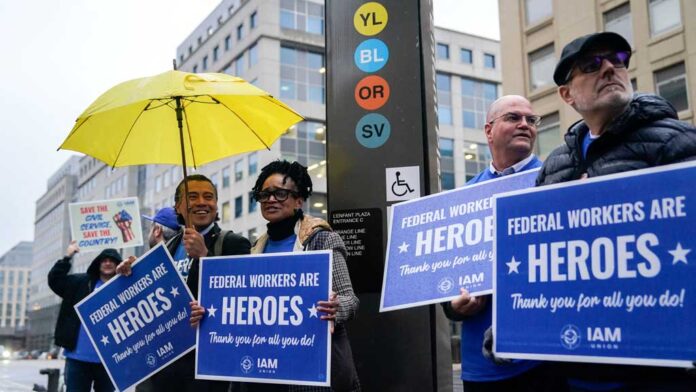A U.S. appeals court ruled Wednesday that 18 federal agencies can proceed with firing thousands of employees who were initially dismissed as part of President Donald Trump’s workforce purge but later reinstated by a lower-court judge in Maryland.
The Richmond-based 4th U.S. Circuit Court of Appeals determined that the lower court likely lacked jurisdiction over the lawsuit filed by 19 states and Washington, D.C., challenging the February mass terminations of probationary government employees.
Probationary workers generally have less than a year in their current roles, though some are longtime federal employees in new positions.
In a 2-1 ruling, the 4th Circuit stayed the Maryland court’s decision pending the Trump administration’s appeal, eliminating the last legal barrier preventing the government from once again dismissing the probationary employees.
A day earlier, the U.S. Supreme Court had paused a separate ruling by a San Francisco judge that required six agencies to reinstate nearly 17,000 probationary workers. Since five of those agencies were also involved in the Maryland case, the Supreme Court’s order had only a limited impact.
Maryland Attorney General Anthony Brown’s office, leading the lawsuit, did not immediately respond to requests for comment.
White House spokesperson Taylor Rogers welcomed the appeals court’s ruling, stating that it reaffirmed the president’s authority over federal employment decisions.
“The Trump Administration continues to rack up legal wins for the American people,” Rogers said.
Federal agencies terminated approximately 25,000 probationary employees in mid-February after the U.S. Office of Personnel Management instructed them to identify non-essential workers.
The mass firings were part of a broader initiative by Trump and billionaire Elon Musk to significantly reduce the federal workforce and cut government spending, drawing legal challenges.
U.S. District Judge James Bredar in Baltimore had initially issued a temporary restraining order in March, requiring the government to reinstate roughly 24,600 probationary workers. Last week, he scaled back the order to apply only to those living or working in Washington, D.C., and the states involved in the lawsuit. The 4th Circuit put that ruling on hold Wednesday.
‘What’s It to Them?’
The states argue that the mass dismissals violated a federal law requiring agencies to provide states with 60 days’ notice of mass layoffs. They claim the firings would lead to increased unemployment claims and heightened demand for social services.
In its brief order, the 4th Circuit stated that Bredar likely lacked jurisdiction but did not elaborate further. The Trump administration contended that the states lacked legal standing to sue because they had not demonstrated direct harm from the government’s actions.
Dissenting, Circuit Judge DeAndrea Gist Benjamin argued that the states had proven financial harm, including lost tax revenue and increased unemployment claims, giving them standing to challenge the firings.
“The states have successfully answered the question: ‘What’s it to them?'” wrote Benjamin, an appointee of former President Joe Biden, a Democrat.
The two judges who ruled to stay Bredar’s decision were appointed by Republican presidents.



